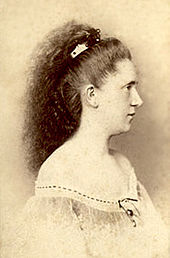Ingeborg Bronsart von Schellendorf
Ingeborg Marie Wilhelmine Bronsart von Schellendorf born. Starck (born August 24, 1840 in Saint Petersburg , † June 17, 1913 in Munich ) was a German pianist and composer.
Life
She came from a family of Finnish merchants residing in Russia. She learned to play the piano in Saint Petersburg with Nikolai Martynow, Konstantin Decker and Adolf von Henselt . In 1858 she came to Weimar , where she learned to play the piano with Franz Liszt . In 1861 she married a Liszt student, Hans Bronsart von Schellendorf . In the following years she performed concerts in cities in Russia.
After her husband was appointed general director of royal theaters in Hanover in 1867 , she had to interrupt her performances and began to occupy herself with composition. Joseph Joachim , Hans von Bülow , Friedrich Kaulbach , Friedrich Bodenstedt and many other people from German culture visited the salon of the Bronsart family . Among the works of Ingeborg Bronsart, her operas enjoyed particular popularity: The goddess of Sais or Linas and Liane , Jery and Bätely with the libretto based on Johann Wolfgang von Goethe , King Hiarne (1890) as a polemic against Richard Wagner's Ring des Nibelungen . The Kaiser Wilhelm March was heard at the opening of the women's program at the World's Fair (1893) in Chicago .
She created many songs to texts by Heinrich Heine , August von Platen , Mirza-Schaffy (in translation by Friedrich Bodenstedt ) and Michail Lermontow . Her works also included a (lost) piano concerto (1863), which she a. a. played on November 21, 1863 in Hanover under the direction of Joseph Joachim .
Works
Operas
- The goddess of Sais or Linas and Liana (1867)
- King Hiarne (1871)
- Jery and Bätely (1873)
- The Atonement (1909)
Concerts
- Piano Concerto in F minor, (1863), lost.
Orchestral works
- Kaiser Wilhelm March (1871)
Songs (selection)
- Abendlied , op.16 no.1 (text: Ernst von Wildenbruch )
- Farewell to the Caucasus , op.10 no.2 (Text: Friedrich Martin von Bodenstedt )
- Das Vöglein , op.10 no.5 (Text: Friedrich Martin von Bodenstedt based on an unknown author)
- The bouquet of flowers , op.16 no.4 (text: Ernst von Wildenbruch)
- The bright sun shines , op.8 no.5 (Text: Friedrich Martin von Bodenstedt after Mirzə Şəfi Vazeh )
- The Loreley (Text: Heinrich Heine)
- Yellow rolls at my feet , op.8 no.4 (Text: Friedrich Martin von Bodenstedt after Mirzə Şəfi Vazeh )
- I feel your breath , op.8 no.6 (Text: Friedrich Martin von Bodenstedt after Mirzə Şəfi Vazeh )
- I cried in a dream (Text: Heinrich Heine)
- I stood in dark dreams , op.25 (Three Songs) no.3 (Text: Heinrich Heine )
- The nightingale laments in the garden, op.8 no.2 (Text: Friedrich Martin von Bodenstedt after Mirzə Şəfi Vazeh )
- Last request , op.16 no.5 (text: Ernst von Wildenbruch )
- I once had a beautiful dream , op.10 no.1 (Text: Friedrich Martin von Bodenstedt)
- Nachtigall, o Nachtigall , op.10 no.4 (Text: Friedrich Martin von Bodenstedt based on an unknown author)
- Sing, sing with sunrise, op.10 no.6 (Text: Friedrich Martin von Bodenstedt, unknown author)
- Serenade , op.16 no.2 (text: Ernst von Wildenbruch )
- When spring rises on the mountains, op.8 no.3 (Text: Friedrich Martin von Bodenstedt after Mirzə Şəfi Vazeh )
- How smile the eyes , op.10 no.3 (Text: Friedrich Martin von Bodenstedt)
- Zuléikha , op.8 no.1 (Text: Friedrich Martin von Bodenstedt after Mirzə Şəfi Vazeh )
- Two bouquets , op.16 no.3 (text: Ernst von Wildenbruch )
Web links
- Katharina Hottmann, Ingeborg von Bronsart . In: MUGI - Music and Gender on the Internet at the Hamburg University of Music and Theater
- Lexicon article by the Sophie Drinker Institute
- Works by and about Ingeborg Bronsart von Schellendorf in the German Digital Library
- Sheet music and audio files by Ingeborg Bronsart von Schellendorf in the International Music Score Library Project
Individual evidence
- ^ Georg Fischer , Musik in Hannover , Hannover 1903, p. 267 ( Textarchiv - Internet Archive )
| personal data | |
|---|---|
| SURNAME | Bronsart von Schellendorf, Ingeborg |
| ALTERNATIVE NAMES | Bronsart von Schellendorf, Ingeborg Marie Wilhelmine (full name); Starck, Ingeborg (maiden name) |
| BRIEF DESCRIPTION | German pianist and composer |
| DATE OF BIRTH | August 24, 1840 |
| PLACE OF BIRTH | St. Petersburg |
| DATE OF DEATH | June 17, 1913 |
| Place of death | Munich |
